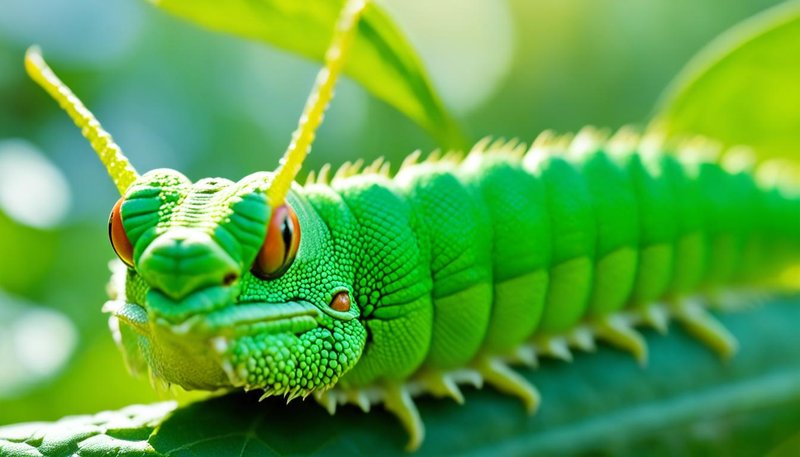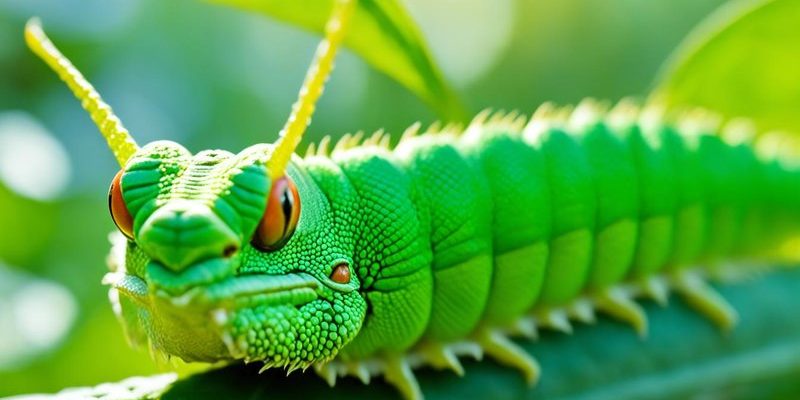
Hornworms, specifically the *Manduca sexta*, are the larval stage of the tobacco hornworm moth. They’re known for their plump bodies and vibrant green color, giving them an almost magical look. As you consider hornworms as a potential food source, think of them as a gourmet meal compared to the everyday insects like crickets or mealworms. They’re not just a snack; they can play a significant role in your reptile’s diet. Let’s dive deeper into what makes hornworms an enticing option for your scaly friend.
What Are Hornworms?
Hornworms are large caterpillars that are easy to recognize thanks to the distinctive horn protruding from their back. They typically grow to about 4–5 inches in length, making them quite a substantial meal for reptiles. These caterpillars are the larval form of the sphinx moth, and they thrive on specific plants, primarily tobacco and tomatoes, which is why they might pop up in backyard gardens.
One of the appealing aspects of hornworms is their nutritional composition. They are packed with proteins, and they also contain essential vitamins and minerals that can benefit reptiles. Their moisture content is high, making them an excellent choice for hydration as well. So, if you’re looking to diversify your pet’s diet and introduce something more nutritious, hornworms might just be the solution.
However, before you decide to sprinkle hornworms into your pet’s feeding routine, it’s crucial to understand where to source them. Many pet stores stock hornworms, and you can also find them online. Some brands even sell them pre-packaged, ensuring they come with the proper care guidelines.
Benefits of Feeding Hornworms to Reptiles
There are several benefits to incorporating hornworms into your reptile’s diet. First and foremost, their high protein content can support growth and muscle development in young reptiles. For growing reptiles, this is especially important because they need the right nutrition to fuel their active lives.
Additionally, hornworms are rich in moisture, which helps keep your reptile hydrated. Hydration is crucial, especially in reptiles that may not drink water directly. For instance, leopard geckos or bearded dragons can benefit from this moisture content, helping to prevent issues like dehydration or kidney problems.
Hornworms also have a unique texture that many reptiles find irresistible. This can be especially useful for picky eaters or those recovering from illness. If you’ve ever struggled to get your reptile to eat, introducing hornworms can sometimes do the trick. They’re like candy for your pet! Just be mindful not to overfeed, as with any treat.
How to Feed Hornworms to Your Reptile
Feeding hornworms to your reptile is pretty straightforward, but there are some best practices to keep in mind. Here’s a simple step-by-step guide to help you out:
- Purchase Fresh Hornworms: Ensure you buy them from a reliable source, whether a pet store or an online retailer.
- Check Size: Make sure the hornworms are appropriately sized for your reptile. Generally, they should be no larger than the width of your pet’s head.
- Introduce Gradually: Start with just a few hornworms to gauge your pet’s reaction. Monitor closely for any digestive issues.
- Remove Uneaten Worms: Always take out any uneaten hornworms after a few hours to prevent them from becoming a nuisance in the habitat.
The best time to feed hornworms can vary. Many owners choose to offer them during regular feeding times or as a treat on special occasions. Just remember to keep an eye on your pet’s overall diet. Hornworms should complement their main food source rather than replace it.
Things to Consider Before Feeding Hornworms
While hornworms can be an excellent addition to your reptile’s diet, there are a few things to keep in mind. First, hornworms are higher in fat than some other feeder insects. Regularly feeding them can lead to obesity in reptiles if not balanced with other food sources.
Also, hornworms are not particularly shelf-stable. They have a short lifespan, so it’s best to feed them while they’re fresh. Always check for any signs of mold or rot before offering them. Proper storage is key—keep them in a cool, ventilated area to maintain their quality.
Lastly, be aware of your reptile’s individual dietary needs. Some reptiles require a more specialized diet based on their species, age, and health status. Always consult with a veterinarian or a reptile expert if you’re uncertain about your pet’s nutrition.
Comparing Hornworms to Other Feeder Insects
You might be wondering how hornworms stack up against other common feeder insects like crickets, mealworms, or superworms. Each option has its pros and cons, so let’s break it down.
– Crickets: They’re a staple for many reptiles and are readily available. However, crickets are lower in moisture and can sometimes have a strong odor.
– Mealworms: These have a longer shelf life and are easy to care for, but they’re higher in fat and lower in moisture compared to hornworms.
– Superworms: Similar to mealworms with added size, they also pack a punch in fat content. Hornworms tend to offer a better balance for hydration and protein.
Hornworms truly shine with their unique nutritional profile and texture. While they shouldn’t be the sole food source, they’re a fantastic option for variety and excitement in your pet’s diet.
Where to Buy Hornworms for Reptiles
Finding quality hornworms doesn’t have to be a headache. Many local pet stores sell hornworms, typically in small cups, which is great for feeding your reptiles right away. Online options also abound, with brands like *ReptileSupply* and *Rainbow Mealworms* that offer delivery straight to your door.
When purchasing online, look for options that come with feeding instructions and care guidelines. This can be a lifesaver, especially if you’re new to caring for hornworms. A quick browse through customer reviews can also help you find a reputable source.
Hornworms can be a wonderful addition to your reptile’s diet, offering not just flavor but also nutrition. With their high protein and moisture content, they can help keep your pet healthy and happy. Just remember to feed them in moderation and always monitor your reptile’s overall well-being.
So, if you’re looking for a vibrant and nourishing treat for your pet, give hornworms a try! You might find that they elevate mealtime into a mini feast. As always, stay informed, consult with experts when needed, and enjoy this delightful journey into reptile care.

